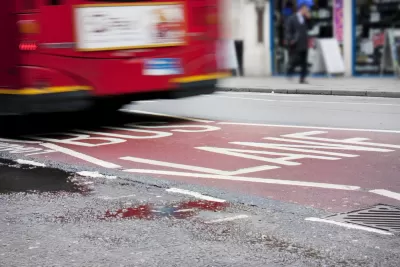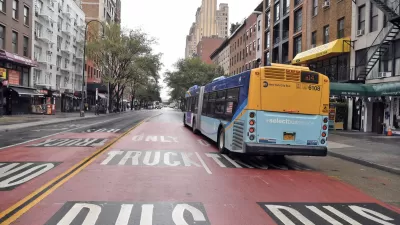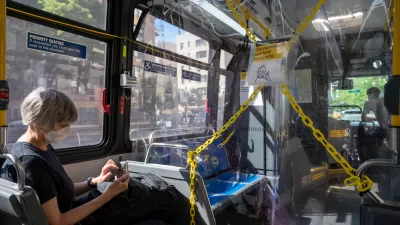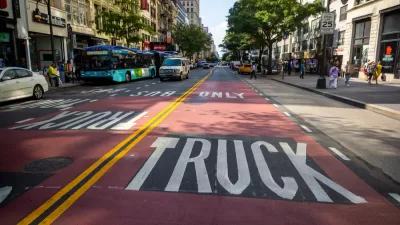As cities streamline approval processes for bus-only lanes during the pandemic, transit experts hope the projects will lead to lasting change.

In a discussion hosted by TransitCenter on the efficacy of bus lanes installed during the COVID-19 pandemic, transportation professionals weighed in on the need for continued and improved bus service and the effects of the pandemic on transit systems across the country.
The pandemic only highlighted existing inequities in transit systems. While trains tend to serve white-collar workers who have largely shifted to working from home, buses remain a crucial lifeline for essential workers, many of whom are low-income and depend on buses to access jobs. During the pandemic, train ridership in Chicago dropped by 80%, while bus ridership stayed essentially the same.
To take advantage of lighter traffic and improve the efficiency of bus systems, some cities have fast-tracked bus lane projects this year, with Boston adding 14 miles of bus lanes in 2020. By reducing barriers to bus lane projects and implementing quick, temporary solutions, cities can improve traffic in the short term and gain support for making bus lanes permanent in the future as travel picks back up and users see the benefits of more efficient transit service.
FULL STORY: How have pandemic bus lanes worked out in Chicago, Boston, and SF?

Alabama: Trump Terminates Settlements for Black Communities Harmed By Raw Sewage
Trump deemed the landmark civil rights agreement “illegal DEI and environmental justice policy.”

Study: Maui’s Plan to Convert Vacation Rentals to Long-Term Housing Could Cause Nearly $1 Billion Economic Loss
The plan would reduce visitor accommodation by 25% resulting in 1,900 jobs lost.

Planetizen Federal Action Tracker
A weekly monitor of how Trump’s orders and actions are impacting planners and planning in America.

Wind Energy on the Rise Despite Federal Policy Reversal
The Trump administration is revoking federal support for renewable energy, but demand for new projects continues unabated.

Passengers Flock to Caltrain After Electrification
The new electric trains are running faster and more reliably, leading to strong ridership growth on the Bay Area rail system.

Texas Churches Rally Behind ‘Yes in God’s Back Yard’ Legislation
Religious leaders want the state to reduce zoning regulations to streamline leasing church-owned land to housing developers.
Urban Design for Planners 1: Software Tools
This six-course series explores essential urban design concepts using open source software and equips planners with the tools they need to participate fully in the urban design process.
Planning for Universal Design
Learn the tools for implementing Universal Design in planning regulations.
Caltrans
Smith Gee Studio
Institute for Housing and Urban Development Studies (IHS)
City of Grandview
Harvard GSD Executive Education
Toledo-Lucas County Plan Commissions
Salt Lake City
NYU Wagner Graduate School of Public Service





























